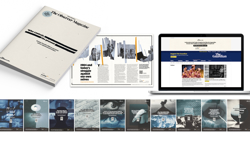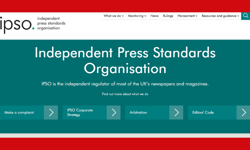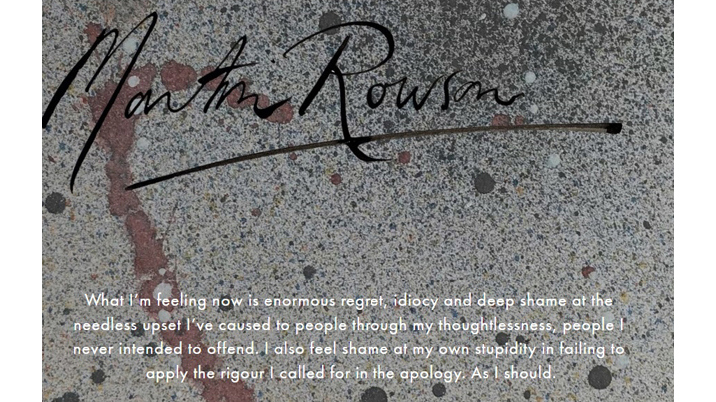
The Sun’s silence
None of us likes to admit we were wrong or to broadcast others’ criticisms of our failings. But when those complaints are made loudly in a public forum, it’s a bit daft, to put it mildly, to stick our fingers in our ears and sing “la la la”. And when we are in the business of loudly and publicly criticising others, it is frankly hypocritical.
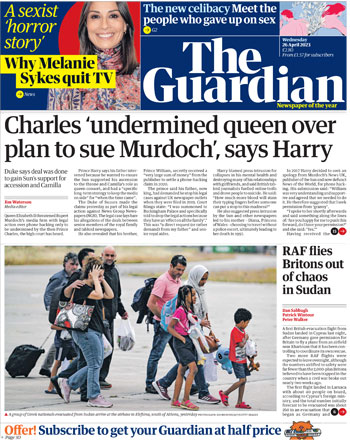
Yet this is what our newspapers do, time and again. Last week, Prince Harry continued his journey through the British courts, this time with the Sun in his sights. Documents presented to the High Court included the assertion that his brother had taken “a very large sum of money” from News Group Newspapers as part of an agreement not to sue over phone hacking. That’s some accusation. As with Doreen Lawrence when the Harry caravan took on the Mail earlier in the month, the story made the splash for the Guardian under the headline “Charles ‘undermined Queen over plan to sue Murdoch’, says Harry”. There was another front-page story the next day – the claim that Piers Morgan knew about hacking when he was at the News of the World – and the next, with a picture of Hugh Grant accusing the Sun of being behind a burglary at his home.
Of all this, not a word has appeared in the Sun, whose owners are seeking to have the case thrown out as being out of time – as Associated are with the case against the Mail papers. The Mail’s reporting of its case may have been skewed towards the defence, but at least it was there. The Sun simply pretended it wasn’t happening.
The Sun, however, is not in the habit of turning other publishers’ woes into front-page stories. The Guardian most certainly is. There is an argument that such an approach is justified, especially with such high-profile litigants. I’d agree with that, up to a point. I think the alleged William payout was definitely worth the front – it splashed the Telegraph too. But the Morgan story? The Hugh Grant picture? Three days on the bounce? That begins to smack of schadenfreude rather than newsworthiness.
News avoidance at the Guardian
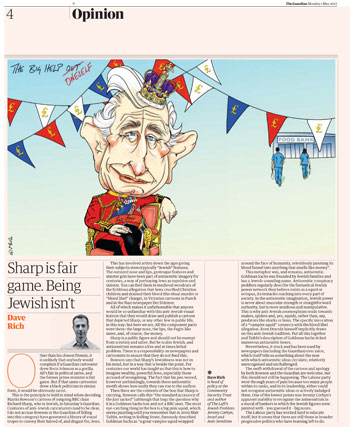
And what about when the Guardian is in the dock? Well, we had that big mea culpa over the Scott Trust and the slave trade last month. Look at us! We’re upfront about our past sins. Which makes me wonder how I missed the stories in the paper this week about Martin Rowson’s Saturday cartoon. There were reports in the Sun, Mail, Express, Times and Telegraph, comment pieces by Richard Littlejohn, Dominic Lawson, Vanessa Feltz and Charles Moore. Oh, and a column by Dave Rich in the Journal section of Monday’s Guardian.
That explained all that was wrong about the Rowson cartoon, in which the departing BBC chairman Richard Sharp (we’ll come back to him later) had a walk-off part with a box of antisemitic tropes. Other newspapers told us that the paper had taken down the cartoon from its website, that it had apologised to Sharp, the Jewish community and anyone who was offended, that editor Kath Viner had approached the Board of British Deputies for a meeting, that Boris Johnson and the National Jewish Assembly had called for Viner and Rowson to be sacked. But the Guardian carried not a line of this in its news pages. Dear oh dear.
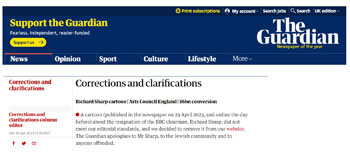
Perhaps it was taking the “never complain, never explain” approach, since it didn’t even report Rowson’s swift Twitter apology or longer online explanation – in print at least. Sunday’s corrections and clarifications section of the website did say that the cartoon had been taken down because it did not meet the paper’s editorial standards and apologised. But that was it.
Through carelessness and thoughtlessness I screwed up pretty badly with a Graun toon today & many people are understandably very upset. I genuinely apologise, unconditionally. A fuller response will be on my website in about an hour. I'll post the link here as soon as I have it.
— Martin Rowson (@MartinRowson) April 29, 2023
That rightwingers with little time for the Guardian should weigh in is understandable – Andrew Neil tweeted a link to a Stephen Daisley article for the Spectator (of which Neil is chairman) on the Guardian’s “shameful double standards”, commenting “Rowson. Guardian cartoonist. Nasty man. Produces nasty cartoons for sometimes nasty paper. No surprise”. But the magazine’s editor, Fraser Nelson, took a more charitable view, writing that it was the cartoonist’s job to satirise and that a standard device was to exaggerate a subject’s prominent features – as his own publication was doing with the King’s ears in its upcoming coronation issue. He accepted Rowson’s explanation for the Goldman Sachs vampire squid detail and described the entire furore as a threat to free speech. Nelson tweeted the link to his piece on Sunday, saying “He made an honest explained mistake…those who abhor cancel culture (and the lack of forgiveness) should not pile on now just because it’s the Guardian”. Some hope. By yesterday, he was back on Twitter saying (with a wink emoji) that he was not sure he’d ever written anything so slated by everyone.
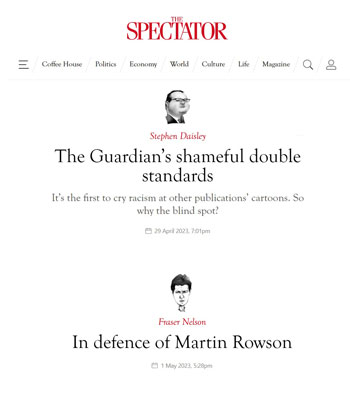
Charles Moore in the Telegraph, while disliking the cartoon, was also more generous than might have been expected. Like Nelson, he was wary of cancel culture, but his main objection to the cartoon was not that a small corner of it looked antisemitic, but that it was ugly: a “crudely drawn, ill-thought-out and strikingly nasty piece of work”.
The Mail piles in
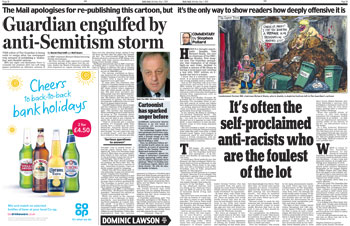
The Mail’s reaction was more predictable, it ran a spread on “Guardian engulfed by anti-semitism storm”, including a comment piece by Stephen Pollard on foul self-proclaimed anti-racists and the cartoon itself. The strapline apologises for republishing this, but says “it’s the only way to show readers how deeply offensive it is”. Not “so that readers can judge for themselves”; we’ll tell them what they should think. And while we’re at it, why don’t we publish some N, C and F words and stick up an online video of someone being abused so that readers can see how nasty they are too. If you think something worthy of debate, that’s one thing. But if you truly believe it to be “deeply offensive”, you don’t publish it. End of.
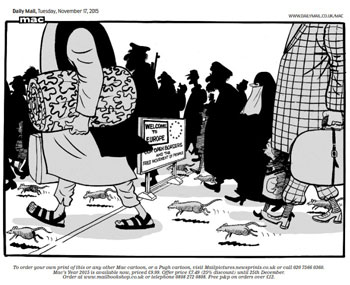
The Mail’s fit of the vapours (it has, to date, carried seven items on the cartoon, including a leader and comment pieces by Littlejohn and Lawson) seemed a bit rich, given that it, too, was accused of racism after running a Mac cartoon depicting non-Christians with exaggeratedly large noses. These were not Jews, but Muslims, some with guns, crossing the “border” into the EU as the exodus from the Syrian civil war gathered pace in 2015. As with the Rowson cartoon, there was a furore online – mostly because of the rats shown running alongside the men with bedrolls and women in hijabs. It was an incitement to racial hatred; it was suggesting Muslims and / or refugees were vermin and terrorists.
The Guardian ran a piece by Archie Bland making some of the points Fraser Nelson made this weekend and quoting other cartoonists defending the work. He asked, “is collateral damage any less severe for being unintended, if indeed it is?” And then, like the Mail, played the “he’s got form” card, citing another Mac effort and concluding, “If that isn’t enough to force the conclusion that yesterday’s image was blatantly racist, it may be nonetheless be relevant to those wondering whether Mac deserves the benefit of the doubt.”
I don’t know about you, but I find a delicious symmetry in this tale of two cartoons.
Crossing the line?
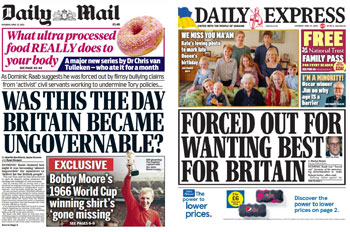
“My dad used to take off his belt and thrash me from here to kingdom come and it never did me any harm.”
These words, or a variation of them, will be familiar to the generations brought up in the second half of the 20th century. Did those thrashings, beatings, beltings, spankings really do the victim no harm? Did they make them stronger, resilient, respectful, or fearful and lacking in self-confidence? Did they go on to hit their own children or resolve never to lay a finger on their offspring?
Many, many thousands of words have been spouted on the subject, but one thing is pretty clear: while the hitting of children was tolerated, even acceptable, in the 1950s or 60s, it isn’t now. We used to hang people. We don’t now. We used to think smoking was a harmless little luxury. We don’t now. Society has moved on. And so it has with other behaviours.
There used to be many workplace environments where aggression and verbal abuse was commonplace. There still are some, but modern managers tend to find it unproductive. They recognise the difference between swearing about situations and swearing at people. If you treat staff badly, they leave or take time off sick. They may even sue.
Some of us took rather too long to learn this lesson. As a junior executive in the 80s, I was too brusque, too abrasive (though not a swearer at people). It made life unpleasant for those who worked with me and damaged my prospects. Others, whose journalistic instincts may not have matched mine but whose people skills far outshone my own, progressed further and faster. I was lucky – or, from a career point of view, perhaps unlucky – to work in a relatively enlightened newspaper office. There were others, where tongue lashings were so frequent that staff would head to the “crying steps” to recover.
It's a long time since I set foot in a newsroom, but I suspect empathy is available in greater abundance across Fleet Street than in my day (though perhaps the generous levels of tolerance, understanding and practical help for those who collapse under stress-induced addictions to alcohol, drugs, gambling are less in evidence). But there will still be “robust” environments, like a Gordon Ramsay kitchen or an Alex Ferguson dressing room, where you are expected to cope with whatever is thrown at you; where there is despair at the “snowflakery” that requires everyone be treated with kid gloves.
Which, I guess, explains the whitetop headlines on Dominic Raab’s resignation. “Was this the day Britain became ungovernable?” demanded the Daily Mail, while the Express asserted that he had been “Forced out for wanting the best for Britain”. The premise here was that “activist” civil servants were standing in the way of government policies, the snowflakes had prevailed with their trumped-up bullying complaints.
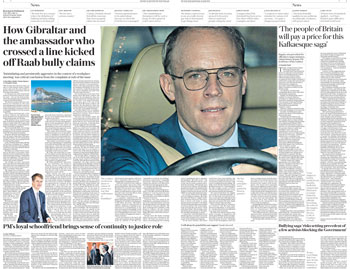
Indeed, an independent inquiry had not upheld the most serious complaints against Raab: he hadn’t sworn at people or physically threatened them. He was, however, found to have been intimidating and impatient. Having promised to resign if the investigation found against him, he had little alternative but to quit. But, as the Times put it, he went out swinging. The bar for bullying was being lowered and this was a threat to democracy, he said. The Telegraph gave him space for a 1,200-word essay on how he had been subjected to trial by media and how the “people of Britain” would pay a heavy price for “this Kafkaesque saga”. Matthew Parris’s column for the Times the next day painted Raab as an unpleasant man for whom many would prefer not to work, but he agreed that he was being hanged for a lamb not a sheep.
The inquiry’s findings struck an uncomfortable chord with me. It found that Raab had been “abrasive” – the very word used against me in the past. He didn’t swear at people. Nor did I. He upset people. So did I. He had to quit. I didn’t. But I wasn’t given the promotions I thought I deserved. There were issues with my approach at a time when Dominic Raab was in what is now called Year Seven at secondary school. A lot has changed in the intervening years; many things some people might have thought acceptable then are more widely frowned on now. Yet our newspapers cling to the “right” to be nasty and turn not on the aggressors, but on their victims.
Being nicer to people isn’t that hard. If Raab had tried it, the “trumped-up snowflake” charges would have melted away.
Survey misinterpretation # 1: anti-woke Britain
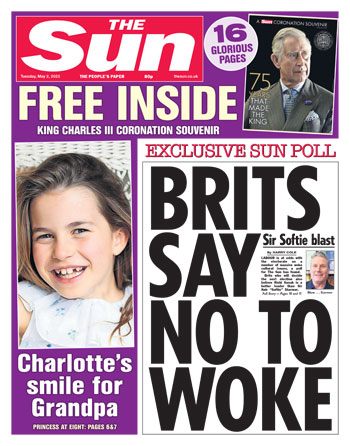
But being nicer to people is, if our best-selling papers and star columnists are to be believed, the ruination of our country. Where they used to rail at “political correctness gone mad”, they are now waging a “war on woke”. The very organisations that remonstrated when the word “gay” was “hijacked” by homosexuals have snatched a word that had a very specific anti-racist meaning and turned it into a catch-all to represent any right-on, leftie, virtue-signalling attitude to which they take exception.
If you’re going to widen the meaning, perhaps “treating people with respect” does the job. But, according to the Sun splash on Tuesday, Brits say “No” to that. Day one of an exclusive YouGov “mega-poll” – it had 3,000 respondents against the usual 1,000 – found that Labour was at odds with the electorate on a “number of massive woke cultural issues” and that people thought Rishi Sunak a better leader than Keir Starmer.
The detailed report inside didn’t include the word “woke”, but covered opinions on migration, sex education, gender identification and Britain’s historical record. It concluded that we were proud of, rather than embarrassed by, our heritage, that the government’s handling of the small boats was poor, that we should remain in the European Convention on Human Rights, and that while sex education in schools was good and should encompass gender identity, it should not go into too much detail.
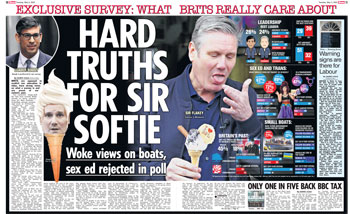
After that, the poll didn’t show a majority for any of the views put forward. Asked if a transgender woman was a woman, 47% said yes and 33% no. On sending asylum-seekers to Rwanda, 46% approved of the deal, while 38% opposed it, but more (40%) thought we should follow ECHR judges’ rulings than ignore them (37%). So we’re pretty split and it seemed quite the push to turn that into “Brits say No to woke”.
The apparent justification came when respondents were broken down according to how they had voted at the last election. Then we got the big numbers – 75% of Tory voters backing the Rwanda policy, 73% being proud of our past, 70% saying we should ignore the ECHR, 60% saying a trans woman is not a woman. This was important, the report contended, because these were the people who had given Boris Johnson his landslide and these were the people who would decide the next election.
Were they? The people who gave Johnson that win, the people who will decide the next incumbent of Downing Street were not “Tory voters” in general, but those who switched from other parties. The killer fact missing here was how many of those swing voters held those views.
Anyone who commissions a survey is going to report the findings that best suit their argument. As I write, YouGov has yet to publish the full survey results. As ever, they are likely to be more enlightening than the edited highlights. Not least, I’m eager to find out who we really want as our leader. That line about Sunak being preferred to Starmer hid a less-than-ringing endorsement for our PM. He had the support of 26%, ahead of 24% for the Labour leader. Are we really still hankering for BoJo?

But I’m getting ahead of myself. For Tuesday’s spread had promised more to come on law and order: “As climate change extremists threaten to derail the King’s Coronation, our mega-survey will make uncomfortable reading for cops and lenient judges.” Mega-survey it may have been, mega-coverage it certainly was not. Day two consisted of a big “woke” headline, three small graphs, a postage stamp protest pic, eight sentences of text and a special treat from Sunak on his instant anti-demo laws. Back on page 25 under some pictures of Elle Macpherson riding a bike. This doesn’t seem like a commitment to a big enterprise. But then again, a shotgun cartridge had been found in the Palace grounds.
Once again, however, the few bits of information we were given suggested that the story had been written to an agenda rather than out of an analysis of the survey results. The headline and intro were both focused on climate protesters, as was the Sunak special. Voters thought the police and judges were too soft on them, the paper said. But was that what really mattered to those questioned? More people thought that police and judges were too lenient than thought they got it right or were too harsh, but they still weren’t in the majority: 44% said police were not harsh enough, going up to 46% for judges. When it came to other crimes, though, voters seemed much more concerned: 71% thought burglaries weren’t taken seriously enough, while 66% had the same view on antisocial behaviour, and 58% each for knife crime and bike theft.
But asking police to do better at catching burglars doesn’t produce quite the anti-woke “eco mob” headline somebody clearly wanted.
Survey misinterpretation # 2: Royalist Britain
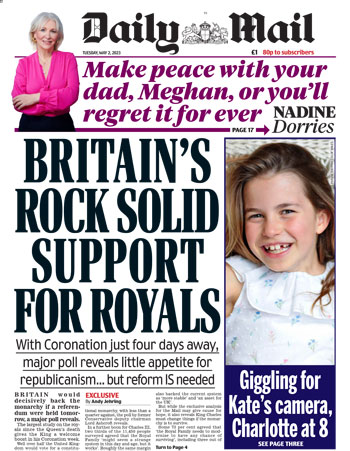
While the Sun was trumpeting its “mega-poll” of 3,000, the Mail had an even bigger survey – 11,000-strong – on how the country views the monarchy. This came under the heading “Britain’s rock solid support for royals”. And, again, it was a case of highlight the bits that you agree with. There was no doubt that the poll showed we are in no mood to abolish the monarchy and become a republic, with 65% (including some republicans) seeing the royal family as a net asset – but there was a strong view that it needed to reform to survive.
Yet the detailed figures were perhaps not as “reassuring for the new King” as the paper suggests. In a league table of the “most popular royals”, the late Queen comes top, finding favour with 74% of those questioned, while Charles manages only 54%, well behind William (64%), Kate and Princess Anne (62% each), and his long-dead first wife (63%). The main text notes that Harry and Meghan’s popularity continues to slump with only Andrew (7%) being less liked, but it doesn’t mention the person immediately above Harry – Camilla, who is viewed favourably by only 39% of those questioned.
This league table also included “The royal family as a whole”, which scored 52% and “the institution of the monarchy” which was looked on kindly by exactly half of those polled. Rock solid?
As ever with the Mail, it’s a case of accentuate the positive, eliminate the negative, don’t mess with Mr (or Mrs) In Between.
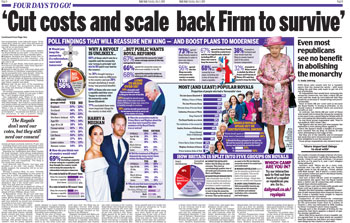
Name calling
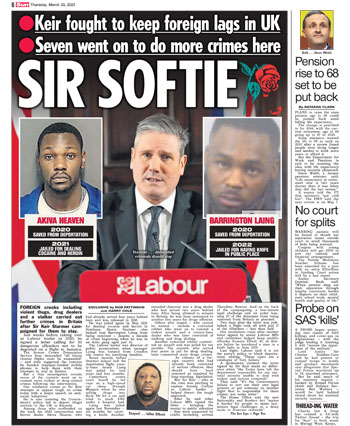
It may have been a stretch for the Sun to characterise its poll as a thumbs down for “woke”, but it was right that it won’t have been particularly comforting reading for Keir Starmer – or “Sir Softie”, as it now calls him.
Starmer has been Labour leader for only three years and is already on his third, fourth or fifth nickname. First, courtesy of Boris Johnson, we had Captain Hindsight – coined during the pandemic. That was dropped after Johnson admitted that “with hindsight”, he should have told people at one of those Downing Street parties to go indoors. Then came another Johnson invention “Captain Snoozefest Crasheroonie”. This was enthusiastically embraced by the Mail, although it struggled to decide whether to spell the last word with an “ie” or “y”.
The Mail has been similarly conflicted this time, although it now seems to have settled on a “Y” for “Sir Softy”. Is this because the name was coined not by a prime minister but by its rival? So it needs to spell it differently to create a point of difference?
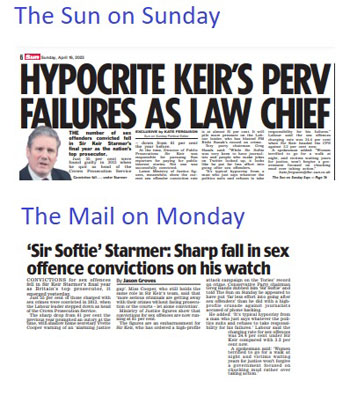
The Sun first came up with the name in March, in reporting that shortly before becoming Labour leader, Starmer had signed a petition to try to halt the deportation of 50 offenders to Jamaica and that seven of the 50 had gone on to commit further crimes in the UK. Last month, it reported that the percentage of defendants convicted of sex offences fell in Starmer’s last year as DPP (the story talks about the “number” falling, but doesn’t actually give any numbers, only percentages). Conservative chairman Greg Hands gave an obliging quote about the hypocritical “Sir Softie” being very keen on having journalists and Twitter jokers locked up, while putting less effort into going after sex offenders.
The next day, the Mail carried an almost identical story, including the sentence “Conservative party chairman Greg Hands dubbed him ‘Sir Softie’ and told the Sun on Sunday…” Well, actually, it was the Sun, but never mind.
A couple of days later, Sunak joined the party, throwing out the jibe during PMQs, saying Starmer was “soft on crime and soft on criminals”.
Now the Mail picked up not only the Sun’s nickname, but also its original story – doing a bit of its own research to come up with an exclusive that one of the undeported Jamaicans was a rapist and he was still living in Britain. This, its splash, asserted was proof that Starmer “really is Sir Softy on crime”. This time it was Sunak who was credited with the branding. There was more the next day with “Sir Softy Part II”.

The Sun, which had previously depicted Starmer as an ice-cream, is still sticking with its original – but on Tuesday it moved on – the caption to its main poll spread photograph of Starmer holding a “99” cornet calls him Sir Flakey. Sweet. Or should it be Sir Flaky?
The Mail, too, is moving on: yesterday it was calling him Sir Flip-Flop because of his change of stance on university tuition fees.
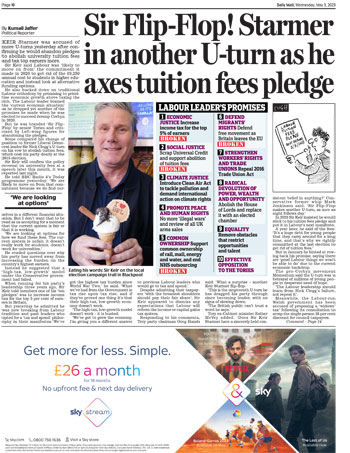
Diane Abbott – say the name
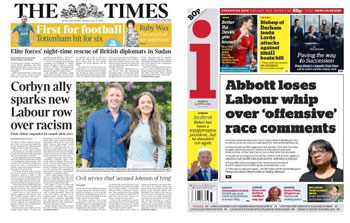
A few weeks back, I mused on how it was a woman’s lot to be seen as an appendage rather than a character in her own right – so-and-so’s secretary, wife, mother etc. How famous do you have to be to be referred to by your own name and with your own agency? More so, it would seem, than Diane Abbott. After her ill-judged letter to the Observer about Jews and prejudice, the Times splashed on “Corbyn ally sparks new Labour row on racism”. OK, the full name wouldn’t have fitted. But “Abbott” and “Labour” in the same headline would have been clear enough.
Judges still not caving
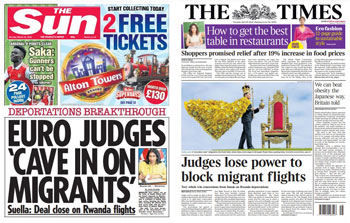
And then there was Suella. In March, you will recall, she took a party of journalists from selected media organisations to Rwanda. They faithfully reported that deportation flights would start in the summer and that the European Court of Human Rights was “on the brink” of caving in to allow them to go ahead. A couple of weeks later, the Sunday Telegraph reported that the Home Secretary was ready to overrule the judges – which seemed a bit unnecessary if they were about to cave in. Then the Sunday before last, the same paper told readers that Braverman was ready to defy judges over migrants and that new powers to give her the right to disregard ECHR rulings were crucial to stopping the small boats. The Times took the same line the following Thursday with “Judges lose power to block migrant flights”. But, but, but…what about the caving in?
Preferential treatment
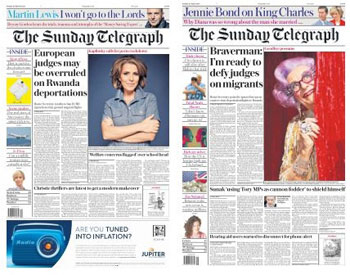
At the time of that Rwanda facility trip, I submitted an FoI request to the Cabinet Office, asking for examples of any such event to which representatives of the Guardian, Mirror, i, Independent or Metro had been invited and from which any of those who went to Kigali had been excluded. A reply arrived just on deadline to say, “We don’t have that information.” Surprise, surprise.
A charitable person would say it was just the luck of the draw that meant that only “friendly” titles accompanied Ms B that time. It was coincidence that the titles (and, indeed, individuals in the form of Pippa Crerar) excluded were the same as those Lee Cain tried to keep out of a David Frost Brexit briefing back in the day. And was it coincidence again last week that the six organisations invited to a “huddle” with Rishi Sunak at the Scottish Conservatives’ conference were the same lot that went to Rwanda – Telegraph, Sun, Express, Times and Mail – plus the Press and Journal? The Herald, Scotsman, the National, the Daily Record were all to have been excluded – not even allowed in the room, let alone to put questions. As with the Downing Street briefing, solidarity won the day and more were eventually allowed to attend. And the story got a wider audience – including in the Sun. Tom Gordon of the Herald wrote a good piece for his paper and an even better one for the web.

Not going without a fight
Contrition doesn’t seem to be a feature of public resignations these days. Boris Johnson blamed “the herd” for his demise, Liz Truss continues to insist she had all the right ideas and that the “woke anti-growth coalition” brought her down, Raab accuses anti-democratic activist civil servants of forcing his departure. And then there was the BBC chairman Richard Sharp, who described the controversy over his attempts to facilitate an £800,000 loan for Boris Johnson as a “distraction”.
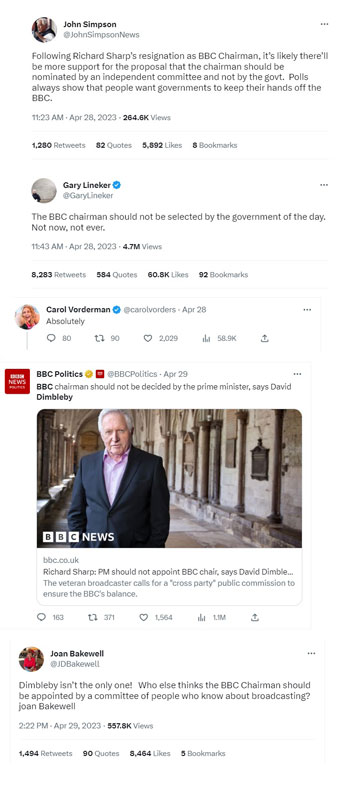
When Raab quit, we were reminded that Gordon Brown had a mighty temper and was alleged to have thrown phones around; when there were murmurings about Sharp’s closeness to the government, we were reminded that one of his predecessors was married to the woman who ran Sarah Brown’s office. And when it comes to spin-doctors like Dominic Cummings wielding too much power (and being too foul-mouthed and aggressive), we’re reminded of the Alastair Campbell years.
“The other lot did it too” seems to be the answer to everything. But that doesn’t make it right. So, it does seem reasonable for the government’s role in choosing who should lead our supposedly independent national broadcaster to be questioned. Even if the answer is “things are fine as they are; what goes around comes around”. Not if you work for the organisation, apparently. Or rather, not if you are Gary Lineker. For once again, this week, he is in trouble with the whitetops for suggesting that the appointment should never be political.
He was not alone in this. David Dimbleby, Joan Bakewell, Carol Vordeman all expressed the same opinion on social media. John Simpson, who as an active journalist is probably the most bound by the need to keep schtum on such matters, went close by tweeting that there would likely be more support for the idea that an independent committee, rather than the government, should nominate the new chairman: adding “Polls always show that people want governments to keep their hands off the BBC.”
But it was, as ever, Lineker who got the flak for “wading in”, as the Mirror put it. And so it was that the Express chose to lead its paper not on Sharp having to resign but on a Tory MP saying that Lineker should be silenced. He should, according to deputy party chairman Lee Anderson, realise that people aren’t interested in his political opinions. Actually, they are. But this wasn’t a political opinion. It was purposely and purposefully apolitical.
If you were ever in any doubt about who should be allowed the right to free speech and who shouldn’t, these two front pages, published five weeks apart, should put you right.
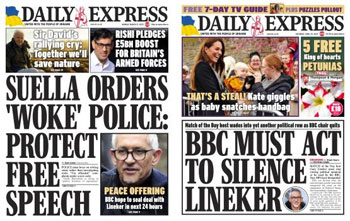
Spread of the fortnight
We hear a lot about freedom of expression and a lot about the importance of a free press, often when someone is questioning the behaviour of our newspapers or a judge is “introducing privacy laws by the back door”. The breast-beating and cries about holding authority to account often ring hollow, but we need to cherish what is good about what we have. There are many places in the world where there are far greater threats to the free press and to journalists than having a tougher regulator or being asked to be a little less nasty or intrusive.
But we’re not much interested in the rest of the world – how much did we read about Sudan before people started worrying about getting Brits out? It would be nice if we could occasionally be a little less insular.
And so instead of a front page of the fortnight, here’s a spread of the fortnight from yesterday’s Guardian – the only paper to mark a day that should be close to everyone in our industry’s heart: World Press Freedom Day.

Liz Gerard’s Notebook is a fortnightly column published in the InPubWeekly newsletter. To be added to the mailing list, enter your email address here.







